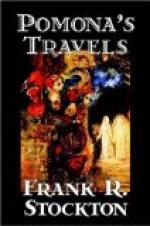To-morrow we leave the Highlands, but as we go to follow the shallop of the “Lady of the Lake,” I should not repine.
Letter Number Twenty-three
[Illustration]
OBAN, SCOTLAND
It would seem to be the easiest thing in the world, when looking on the map, to go across the country from Loch Rannoch over to Katrine and all those celebrated parts, but we found we could not go that way, and so we went back to Edinburgh and made a fresh start. We stopped one night at the Royal Hotel, and there we found a letter from Mr. Poplington. We had left him at Buxton, and he said he was not going to Scotland this season, but would try to see us in London before we sailed.
He is a good man, and he wrote this letter on purpose to tell me that he had had a letter from his friend, the clergyman in Somersetshire, who had forbidden the young woman whose wash my tricycle had run into to marry her lover because he was a Radical. This letter was in answer to one Mr. Poplington wrote to him, in which he gave the minister my reasons for thinking that the best way to convert the young man from Radicalism was to let him marry the young woman, who would be sure to bring him around to her way of thinking, whatever that might be.
I didn’t care about the Radicalism. All I wanted was to get the two married, and then it would not make the least difference to me what their politics might be; if they lived properly and was sober and industrious and kept on loving each other, I didn’t believe it would make much difference to them. It was a long letter that the clergyman wrote, but the point of it was, that he had concluded to tell the young woman that she might marry the fellow if she liked, and that she must do her best to make him a good Conservative, which, of course, she promised to do. When I read this I clapped my hands, for who could have suspected that I should have the good luck to come to this country to spend the summer and make two matches before I left it!
When we left Edinburgh to gradually wend our way to this place, which is on the west coast of Scotland, the first town we stopped at was Stirling, where the Scotch kings used to live. Of course we went to the castle, which stands on the rocks high above the town; but before we started to go there Jone inquired if the place was a ruin or not, and when he was told it was not, and that soldiers lived there, he said it was all right, and we went. He now says he must positively decline to visit any more houses out of repair. He is tired of them; and since he has got over his rheumatism he feels less like visiting ruins than he ever did. I tell him the ruins are not any more likely to be damp than a good many of the houses that people live in; but this didn’t shake him, and I suppose if we come to any more vine-covered and shattered remnants of antiquity I shall be obliged to go over them by myself.




